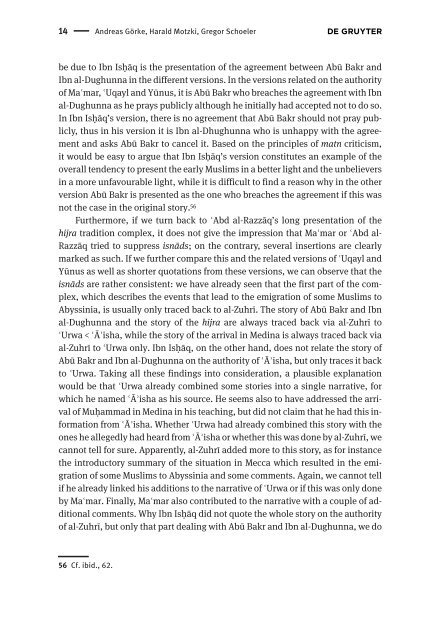0021-1818_islam_98-1-2-i-259
0021-1818_islam_98-1-2-i-259
0021-1818_islam_98-1-2-i-259
You also want an ePaper? Increase the reach of your titles
YUMPU automatically turns print PDFs into web optimized ePapers that Google loves.
14 Andreas Görke, Harald Motzki, Gregor Schoeler<br />
be due to Ibn Is1aq is the presentation of the agreement between Abu Bakr and<br />
Ibn al-Dughunna in the different versions. In the versions related on the authority<br />
of Ma^mar, ^Uqayl and Yunus, it is Abu Bakr who breaches the agreement with Ibn<br />
al-Dughunna as he prays publicly although he initially had accepted not to do so.<br />
In Ibn Is1aq’s version, there is no agreement that Abu Bakr should not pray publicly,<br />
thus in his version it is Ibn al-Dhughunna who is unhappy with the agreement<br />
and asks Abu Bakr to cancel it. Based on the principles of matn criticism,<br />
it would be easy to argue that Ibn Is1aq’s version constitutes an example of the<br />
overall tendency to present the early Muslims in a better light and the unbelievers<br />
in a more unfavourable light, while it is difficult to find a reason why in the other<br />
version Abu Bakr is presented as the one who breaches the agreement if this was<br />
not the case in the original story. 56<br />
Furthermore, if we turn back to ^Abd al-Razzaq’s long presentation of the<br />
hijra tradition complex, it does not give the impression that Ma^mar or ^Abd al-<br />
Razzaq tried to suppress isnads; on the contrary, several insertions are clearly<br />
marked as such. If we further compare this and the related versions of ^Uqayl and<br />
Yunus as well as shorter quotations from these versions, we can observe that the<br />
isnads are rather consistent: we have already seen that the first part of the complex,<br />
which describes the events that lead to the emigration of some Muslims to<br />
Abyssinia, is usually only traced back to al-Zuhr\. The story of Abu Bakr and Ibn<br />
al-Dughunna and the story of the hijra are always traced back via al-Zuhr\ to<br />
^Urwa < ^A#isha, while the story of the arrival in Medina is always traced back via<br />
al-Zuhr\ to ^Urwa only. Ibn Is1aq, on the other hand, does not relate the story of<br />
Abu Bakr and Ibn al-Dughunna on the authority of ^A#isha, but only traces it back<br />
to ^Urwa. Taking all these findings into consideration, a plausible explanation<br />
would be that ^Urwa already combined some stories into a single narrative, for<br />
which he named ^A#isha as his source. He seems also to have addressed the arrival<br />
of Mu1ammad in Medina in his teaching, but did not claim that he had this information<br />
from ^A#isha. Whether ^Urwa had already combined this story with the<br />
ones he allegedly had heard from ^A#isha or whether this was done by al-Zuhr\, we<br />
cannot tell for sure. Apparently, al-Zuhr\ added more to this story, as for instance<br />
the introductory summary of the situation in Mecca which resulted in the emigration<br />
of some Muslims to Abyssinia and some comments. Again, we cannot tell<br />
if he already linked his additions to the narrative of ^Urwa or if this was only done<br />
by Ma^mar. Finally, Ma^mar also contributed to the narrative with a couple of additional<br />
comments. Why Ibn Is1aq did not quote the whole story on the authority<br />
of al-Zuhr\, but only that part dealing with Abu Bakr and Ibn al-Dughunna, we do<br />
56 Cf. ibid., 62.


